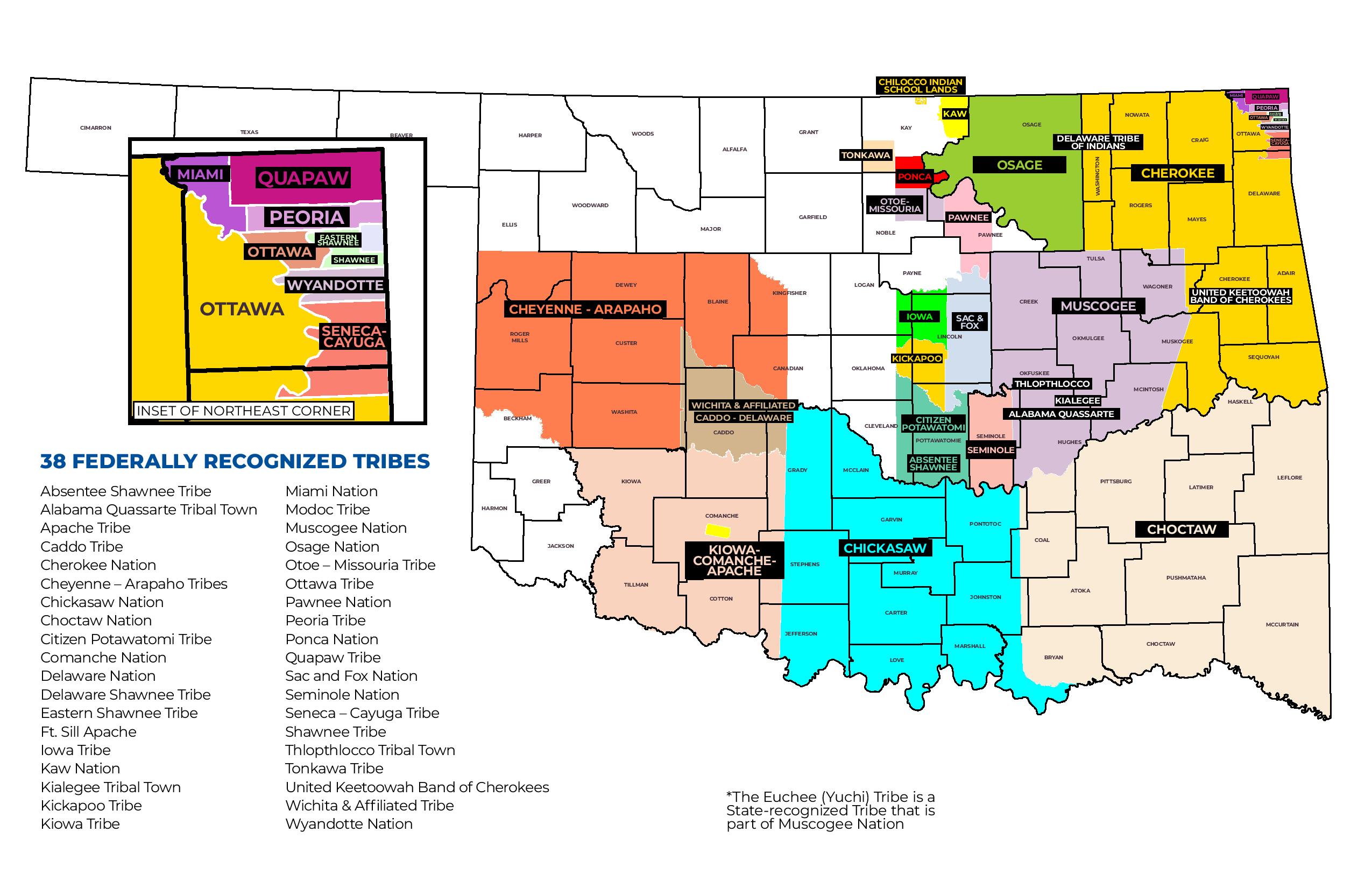Content
Native American Historical Records and Resources
Historical Information
- American Indian Records and Resources
These records include a variety of official documents and information relating to nations in Indian and Oklahoma Territory. The archives include a significant number of records pertaining to the Five Tribes as well as other tribal nations.
- American Indian Alaskan Native Documents In the Congressional Serial Set: 1817-1899
This collection offers detailed contemporaneous documentation of political, military, and governmental activities related to indigenous peoples of the continental United States and Alaskan territory during the 19th century. These government documents were scanned from the print collections of the Oklahoma Department of Libraries and the University of Oklahoma Libraries.
- Office of Tribal Justice
The Office of Tribal Justice (OTJ) was initially formed in 1995 in response to requests from Tribal leaders for a dedicated point of contact for Indian country-specific legal and policy matters. The office was made permanent on July 29, 2010, with the passage of the Tribal Law and Order Act (TLOA). 25 U.S.C. § 3665a(2010).
Laws (U.S. and Tribal)
- U.S. Code Title 25 - Indians
All the sections of the U.S. Code dealing with Indigenous Americans beginning with the creation of the Bureau of Indian Affairs.
- Indian Law Research Guides
Resources for researching Indian Law from the National Indian Law Library.
- Indian Affairs Laws and Treaties by Charles Kappler
Compiled and edited by Charles J. Kappler, this historically significant, seven volume compilation contains U.S. treaties, laws and executive orders pertaining to Native American Indian tribes. The volumes cover U.S. Government treaties with Native Americans from 1778-1883 (Volume II) and U.S. laws and executive orders concerning Native Americans from 1871-1970 (Volumes I, III-VII).- This link leads to a digitized version hosted by Oklahoma State University Library.
- This link leads to a digitized version hosted by Oklahoma State University Library.
- American Indian Law: A Beginner's Guide
This Law Library of Congress guide introduces researchers to major topics and resources on American Indian law, including federal and tribal laws and legal resources.
- Native American Constitution and Law Digitization Project
The University of Oklahoma College of Law Library partnered with the National Indian Law Library to acquire and digitize these materials at a time when tribal documents were very difficult to find. The Project was created as a public service. Tribal documents were shared with permission from the National Indian Law Library or donated directly by tribal members. Other materials included are federal government documents in the public domain or publications shared with the permission of their creators.
- American Indian Law Review
The American Indian Law Review serves as a nationwide scholarly forum for analysis of developments in legal issues pertaining to Native Americans and indigenous peoples worldwide. Publishing two issues each year, AILR circulates in-depth articles by legal scholars, attorneys and other expert observers. In addition, the Review provides comments and notes written by student members and editors on a variety of Indian law-related topics.
Treaties
- Early Recognized Treaties with American Indian Nations
Texts of the nine treaties, created between the years 1722 and 1805, are offered courtesy of the University of Nebraska.
- Indian Affairs: Laws and Treaties
Compiled and edited by Charles J. Kappler, this historically significant, seven volume compilation contains U.S. treaties, laws and executive orders pertaining to Native American Indian tribes. The volumes cover U.S. Government treaties with Native Americans from 1778-1883 (Volume II) and U.S. laws and executive orders concerning Native Americans from 1871-1970 (Volumes I, III-VII).- This link leads to a digitized version hosted by Oklahoma State University Library.
- This link leads to a digitized version hosted by Oklahoma State University Library.
- Treaty with the Cherokee, 1866
railroads, right of way, provide agriculture assistance, provide education assistance, crimes against Indian country, ratified
- Treaty with the Choctaw and Chickasaw, 1866
railroads, provide agriculture assistance, right of way, roads and highways, promise to hire, provide education assistance, ratified
- Treaty with the Creeks, 1866
railroads, right of way, provide education assistance, crimes against Indian country, ratified
- Treaty with the Seminole, 1866
railroads, provide agriculture assistance, provide education assistance, right of way, ratified
Tribal Jurisdictions

- Bureau of Indian Affairs: Tribal Leaders Directory
Map of federally recognized tribes, a map of their jurisdictions, and the contact information for the BIA director for each area.
Dawes Rolls
- Oklahoma Historical Society
Search the Dawes Rolls, 1898-1914 to trace your ancestry back to one of the Five Tribes.
- National Archives
Information about the Dawes Rolls, step by step instructions on how to use them, and links to online resources.
- Freedmen Resources
Supreme Court Cases
- Wikipedia List of all Supreme Court Cases Involving Native Americans
- Oklahoma Tax Commission v. United States (1943)
- Oklahoma Tax Commission v. Citizen Band, Potawatomie Indian Tribe of Oklahoma (1991)
- Oklahoma Tax Commission v. Sac and Fox Nation (1993)
- Chickasaw Nation v. United States (2001)
- Cherokee Nation of Oklahoma v. Leavitt (2005)
- McGirt v. Oklahoma (2020)
- Sharp v Murphy (2020)
- Oklahoma v. Castro-Huerta (2022)
American Indian Resource Center

Tulsa City-County Library's American Indian Resource Center (AIRC) is one of only two centers in public libraries across the nation that provides cultural, educational and informational resources, activities and services highlighting the American Indian culture. The AIRC, which began in 2003, provides access to more than 4,000 books, periodicals, and media for adults and children by and about American Indians, including historical and rare materials, new releases, films and music with a focus on native languages.
